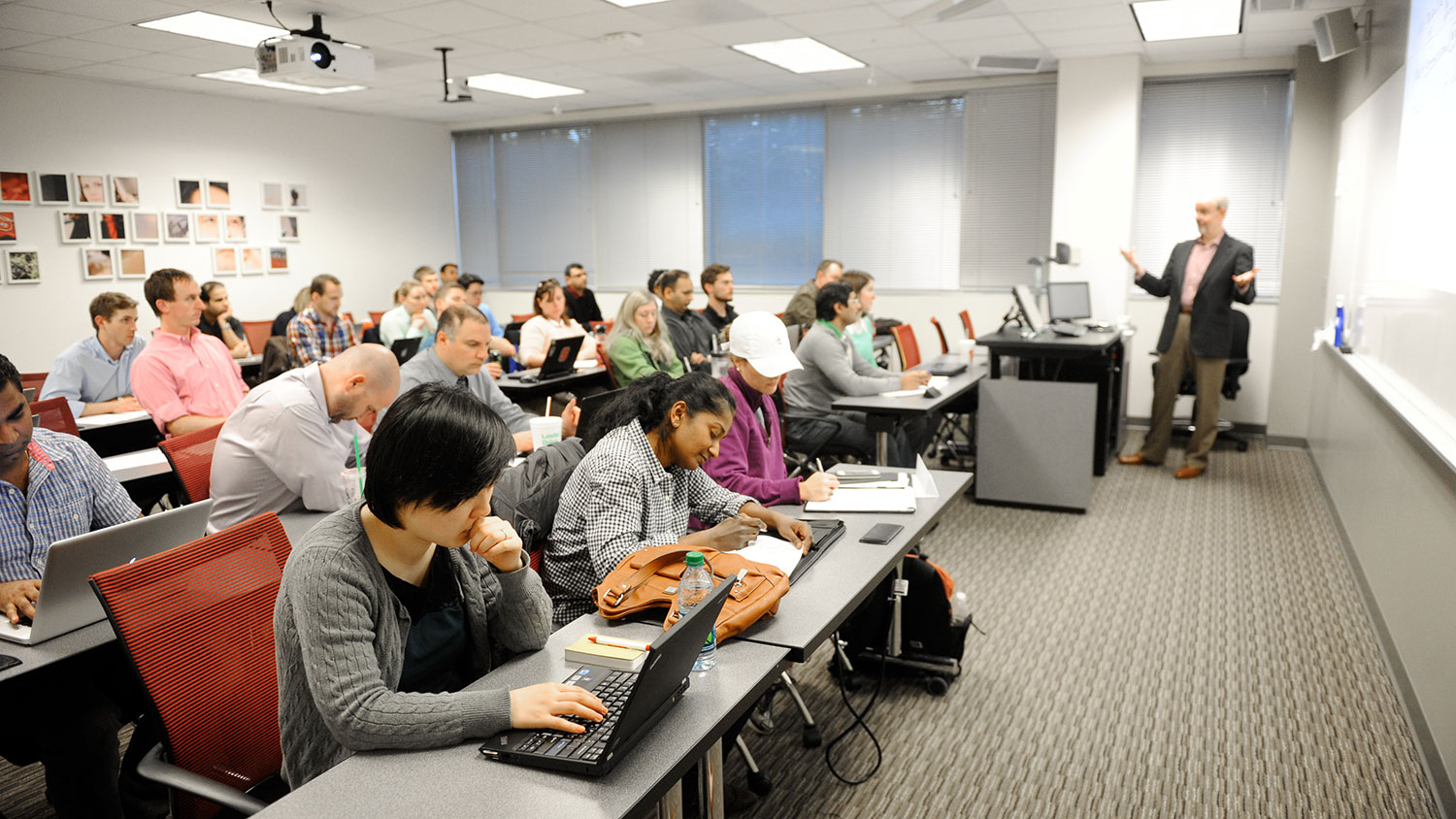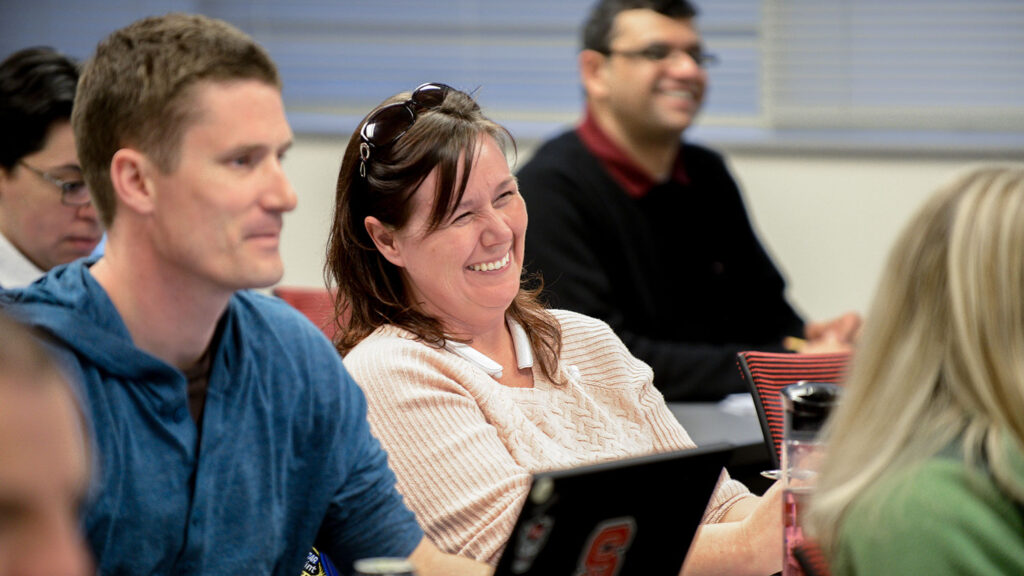Jenkins MBA RTP Campus Met Students Where They Were, Literally and Figuratively
After serving nearly 800 working professional students over 18 years, the Jenkins MBA RTP campus closes its doors — opening new ones for the growing number of students who prefer online course delivery.

For a building with no formal name, the college’s Jenkins MBA campus at Research Triangle Park had a lot of love in the 18 years it served working professional students in the evening.
Before the last class was held at the facility in May, it elevated career options for students and opened the Jenkins MBA Program to a wider range of people, for whom the RTP location was more convenient than NC State’s main campus.
In the process, the RTP campus increased visibility and engagement for Poole and the MBA program.
“It really raised our brand in general. It brought NC State to RTP, which was huge. It’s knowing your customers and meeting them where they are,” says Nichole Miller, assistant dean of Jenkins Graduate Programs.
The RTP location was established in 2006 to cater to MBA students who didn’t want to commute to NC State’s campus in rush-hour traffic on Interstate 40 after working all day. Students who worked at RTP stayed there to attend class.
Now Poole and other business schools are trending away from evening programs “because students don’t want to do that anymore,” Miller says.
Instead, what many working professional students prefer is Poole’s popular online MBA alternative. Those students also can choose a hybrid option, with online and on-campus components.
“We were one of the first research-oriented universities with an online MBA program. Poole has a history of trying things, and they usually work out. If they don’t, we’re smart enough to stop doing them,” economics professor Steve Allen says.
The MBA RTP innovation worked out well, and Allen, then Poole’s associate dean for graduate programs and research, was pivotal in planning the facility. Overall enrollment of evening students in the working professional cohort increased significantly once the facility opened.
The campus had several RTP locations over the years, including a building that was a day care center just before Poole leased it. Despite lacking a fancy name, the RTP facility held plenty of Pack pride, reinforced by NC State-branded wall decorations and signage.
With a break room, coffeepot and vending machines, “There was more of a sense of community. Students got to know each other better in that facility … Before, with that cohort of students, who arrived just before class in Nelson Hall and left immediately afterward, there was really no social stickiness,” Allen says.
And with more networking opportunities at the RTP campus, “Students were getting a higher payoff than just less time stuck in traffic,” he notes.

Eventually, the facility included four classrooms, an administrative suite and conference room. Before the pandemic, a Poole academic adviser and admissions representatives were there each week. “It was all to meet the needs of students and prospective students,” Miller says.
The RTP campus met the needs of about 800 students over the years.
“Closing the facility wasn’t an easy decision. But when you look at the trends in graduate business education, we are once again innovating in closing the option at RTP,” Miller says.
“Closing the facility wasn’t an easy decision. But when you look at the trends in graduate business education, we are once again innovating.”
The innovation to accommodate students includes the new hybrid delivery of the online MBA program, which launched last fall and includes four partial Saturdays on campus. The option provides more networking opportunities and engagement with faculty.
“It helps them feel more connected to the larger NC State organization,” Miller notes. “It’s continuous improvement and understanding what market demands are, while playing to our strengths.”
Poole’s strengths include other Jenkins MBA features and options to help students stand out in the workplace, including certificates to enhance credentials and skills gained from a required practicum and advanced analytics course. Short courses or workshops, possible in the future, would offer more alternatives for professional development.
Continued enrollment growth is a key goal for the MBA program, building on greatly increased interest in both the full-time MBA and professional online options. The online program has reached record enrollment in the past few semesters, MBA program faculty director Don Warsing notes.
“We’re also focused on continuing to refresh and revitalize our curriculum,” he says. That includes growing the enrollment in blended-delivery courses — which combine online and Saturday in-person instruction — and adding professional development opportunities for full-time and Professional Online students.
Warsing is particularly pleased with PACKed Saturdays, the in-person part of the blended-delivery option, on several weekends during the semester. Those days provide more ways for online students to strengthen connections with faculty and peers at meals, featured talks and career panel presentations.
Another highlight Warsing points to is the redesign of some required courses in the online program, a collaboration with Poole College’s Management, Innovation and Entrepreneurship faculty.
“The new course content will provide even more extensive opportunities for our students to develop the leadership and management skills that can set them apart as outstanding leaders in their organizations,” he says.
Artificial intelligence will influence Poole programs, too, and could lead to customizing courses for different learning styles.
“You have to constantly be thinking about how you best deliver programs to students.”
“You have to constantly be thinking about how you best deliver programs to students. And it’s going to keep changing,” Allen says.
What hasn’t changed is that customization and flexibility distinguish Poole’s high-value MBA program — and draw students.
“What that means to the greater community is that these students are working professionals who live here and give back to the state,” Miller says. “Our students and graduates are contributing to the growth and value of the North Carolina economy.”


